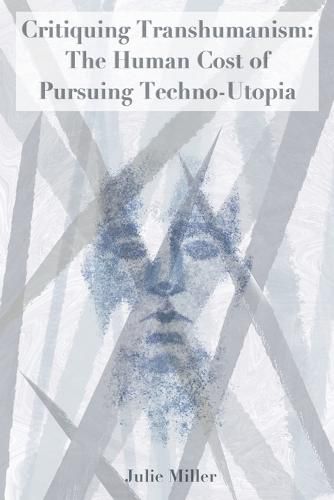Readings Newsletter
Become a Readings Member to make your shopping experience even easier.
Sign in or sign up for free!
You’re not far away from qualifying for FREE standard shipping within Australia
You’ve qualified for FREE standard shipping within Australia
The cart is loading…






This title is printed to order. This book may have been self-published. If so, we cannot guarantee the quality of the content. In the main most books will have gone through the editing process however some may not. We therefore suggest that you be aware of this before ordering this book. If in doubt check either the author or publisher’s details as we are unable to accept any returns unless they are faulty. Please contact us if you have any questions.
Critiquing Transhumanism: The Human Cost of Pursuing Techno-Utopia is a philosophical critique of transhumanism and its envisioned techno-utopia of superintelligence, superlongevity, and superhappiness. Transhumanism is the view that humanity's chief problems can and should be overcome by applying science and technology to the human person, with the ultimate aim to transform humans into a new species of "posthumans." Transhumanists are thoroughgoing materialists, committed to carrying to completion a mechanistic and materialist philosophy to all of reality, including human persons.
This book argues that a techno-utopia of posthumans is metaphysically impossible, not due to any deficiency in technological advancement, but because the assumed materialist philosophy of mind and human persons is false. This conclusion is further established by the author's use of Tolkien's mythology of Middle-earth and selected dystopian literary works to illustrate the dehumanizing consequences of pursuing transhumanism.
Many essential issues of life can easily be seen lurking beneath the surface of any serious discussion of transhumanism and the author provides answers to questions, such as: What does it mean to be human? What is human intelligence? Can a computer be a person? Will cybernetic immortality be beneficial or harmful? Will my identity be preserved through radical enhancements? Will the posthuman "me" still be me? After providing substantial reasons to reject transhumanism, the author then provides a way forward by proposing a return to the philosophical tradition rooted in the works of Aristotle that leads to human flourishing instead of human extinction.
$9.00 standard shipping within Australia
FREE standard shipping within Australia for orders over $100.00
Express & International shipping calculated at checkout
This title is printed to order. This book may have been self-published. If so, we cannot guarantee the quality of the content. In the main most books will have gone through the editing process however some may not. We therefore suggest that you be aware of this before ordering this book. If in doubt check either the author or publisher’s details as we are unable to accept any returns unless they are faulty. Please contact us if you have any questions.
Critiquing Transhumanism: The Human Cost of Pursuing Techno-Utopia is a philosophical critique of transhumanism and its envisioned techno-utopia of superintelligence, superlongevity, and superhappiness. Transhumanism is the view that humanity's chief problems can and should be overcome by applying science and technology to the human person, with the ultimate aim to transform humans into a new species of "posthumans." Transhumanists are thoroughgoing materialists, committed to carrying to completion a mechanistic and materialist philosophy to all of reality, including human persons.
This book argues that a techno-utopia of posthumans is metaphysically impossible, not due to any deficiency in technological advancement, but because the assumed materialist philosophy of mind and human persons is false. This conclusion is further established by the author's use of Tolkien's mythology of Middle-earth and selected dystopian literary works to illustrate the dehumanizing consequences of pursuing transhumanism.
Many essential issues of life can easily be seen lurking beneath the surface of any serious discussion of transhumanism and the author provides answers to questions, such as: What does it mean to be human? What is human intelligence? Can a computer be a person? Will cybernetic immortality be beneficial or harmful? Will my identity be preserved through radical enhancements? Will the posthuman "me" still be me? After providing substantial reasons to reject transhumanism, the author then provides a way forward by proposing a return to the philosophical tradition rooted in the works of Aristotle that leads to human flourishing instead of human extinction.